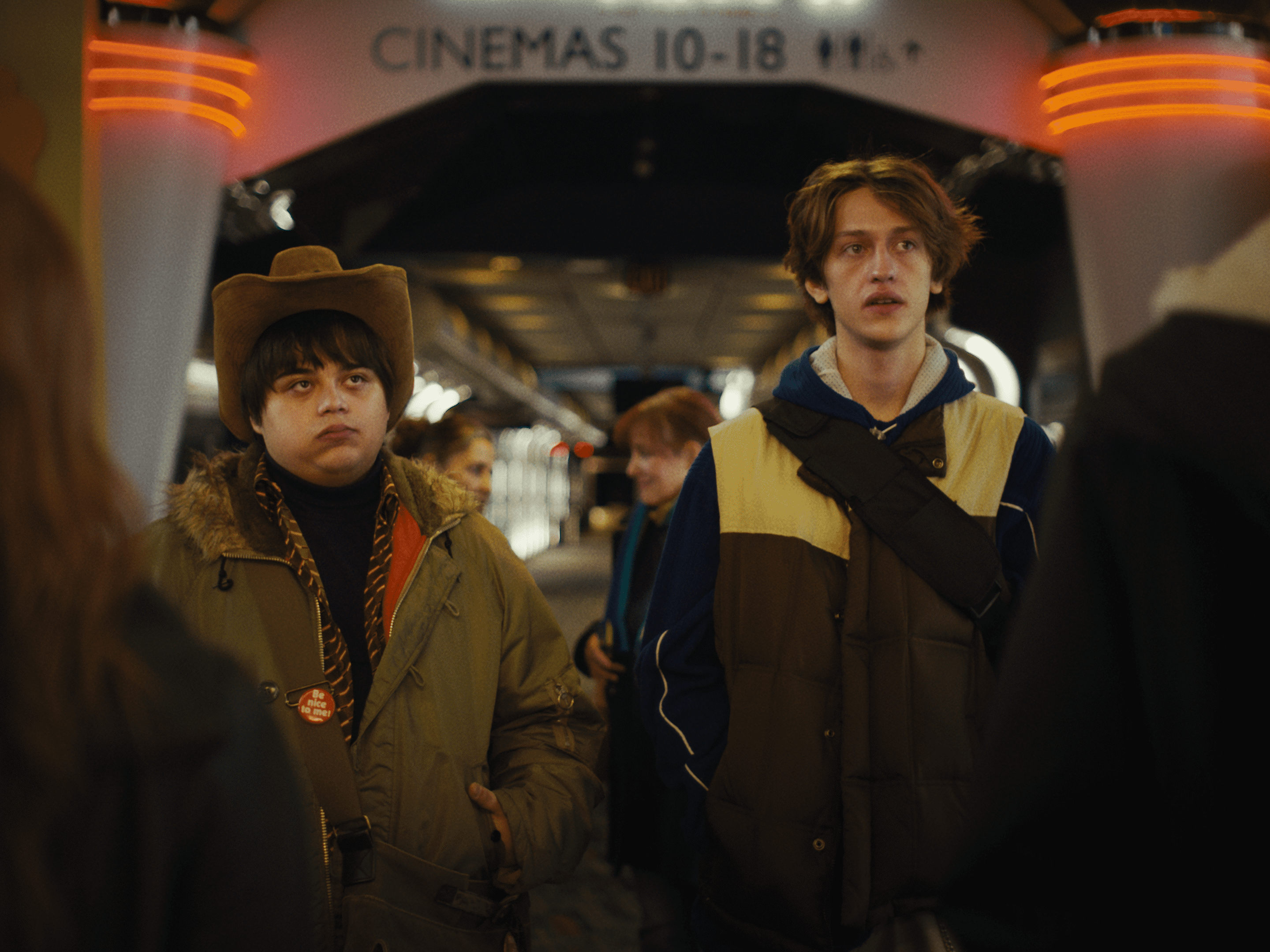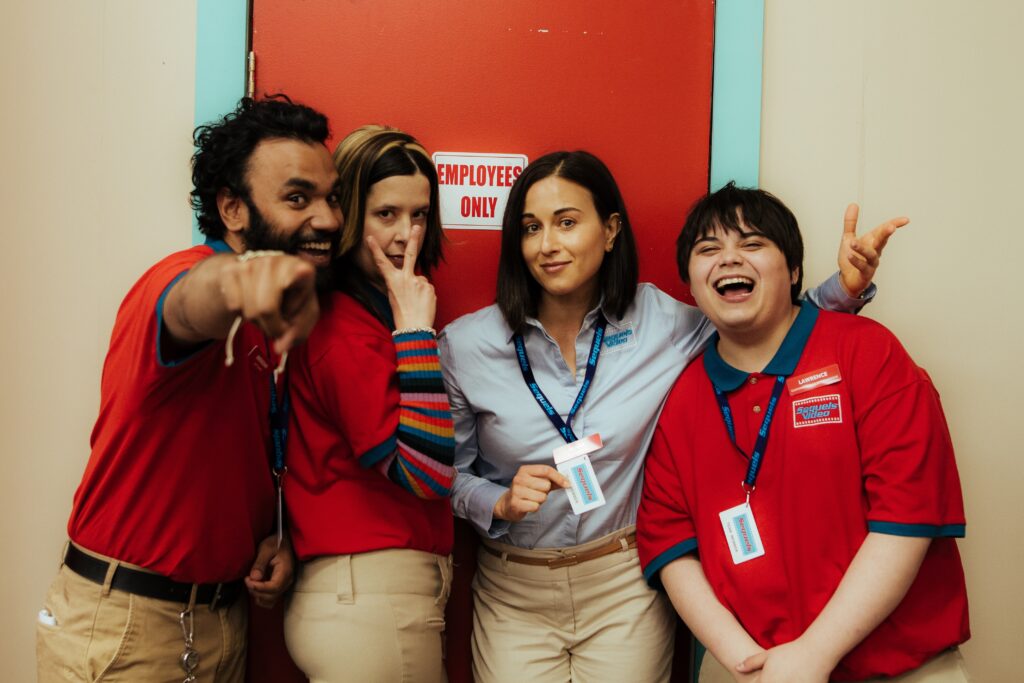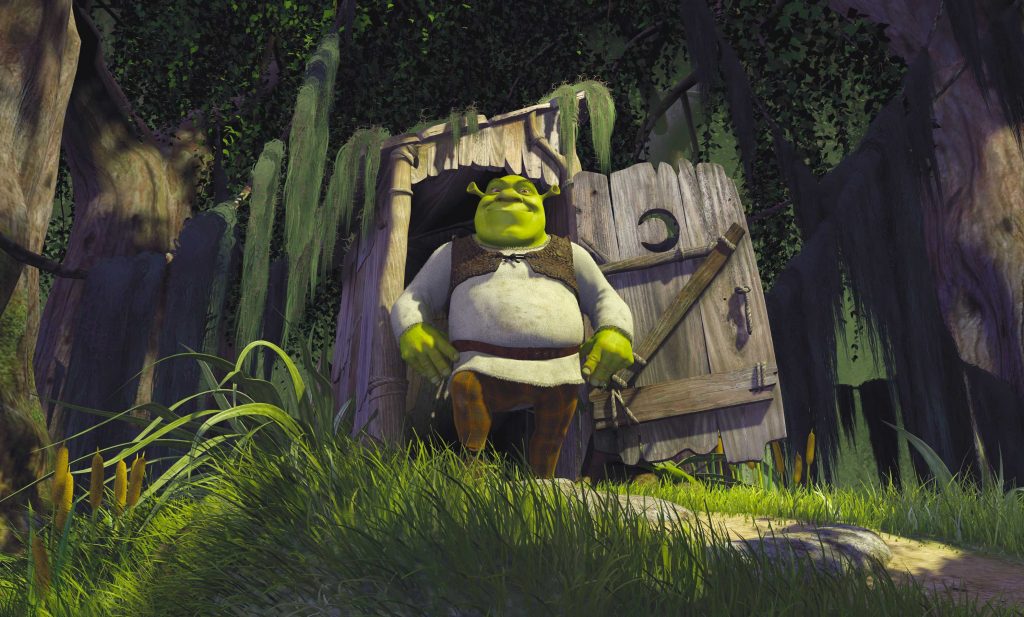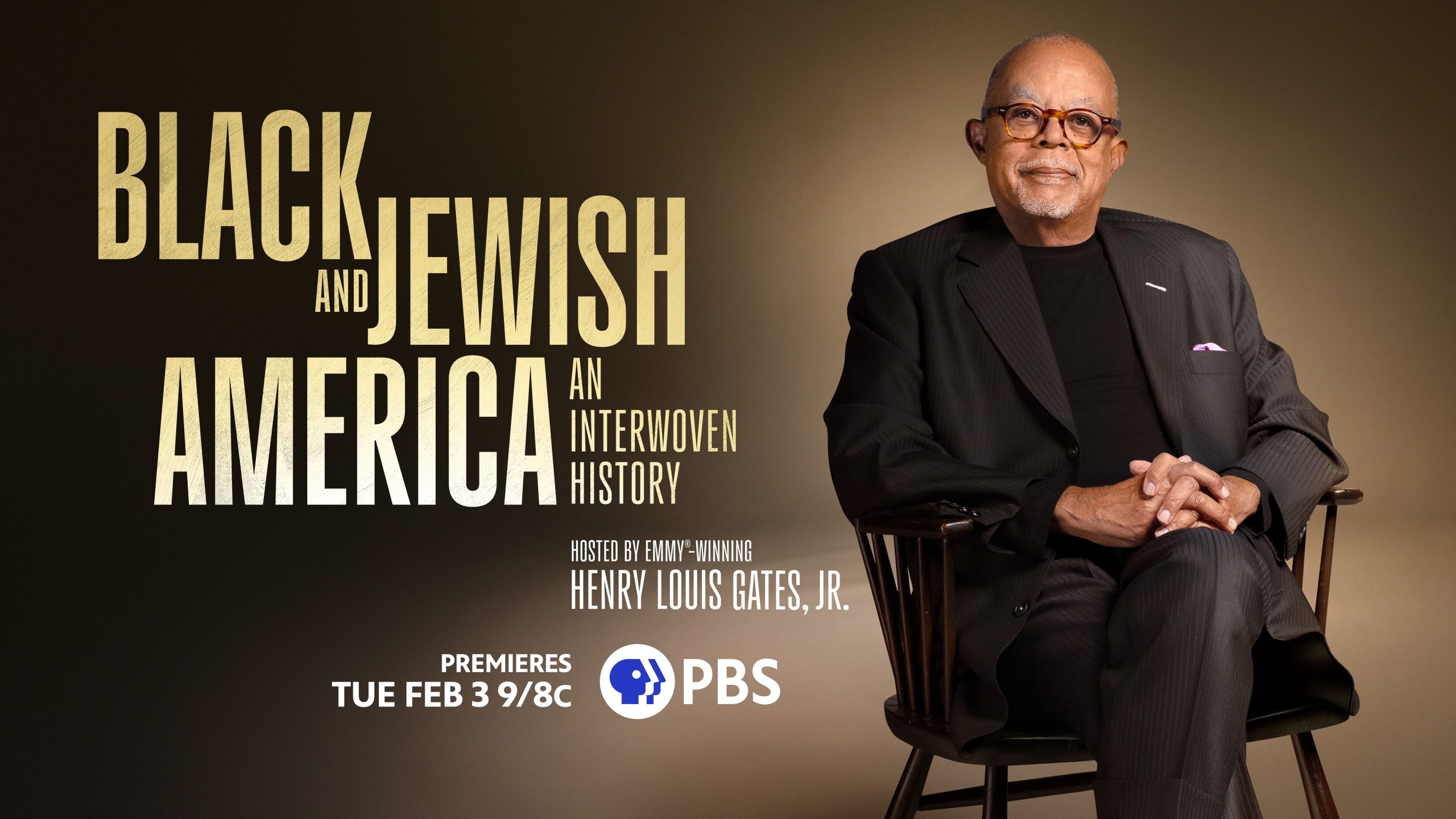
Film journalist/filmmaker Chandler Levack spoke with Solzy at the Movies about premiering I Like Movies during TIFF in September.
Levack is no stranger to TIFF, having previously premiered short film We Forgot To Break Up in 2017. She’s attended the festival many times before, most recently in her capacity as member of the TIFF press corps. This time around, Levack is coming to TIFF with her feature directorial debut and it’s absolutely beautiful. I Like Movies a throwback to a different era in 2002-03 when cinephiles had to walk the shelves of Blockbuster to find something to watch. I’ll have more to say about the film later this week but this is a film for cinephiles and ought to be on everyone’s festival radar.

How honored are you to hold the world premiere of I Like Movies at TIFF?
Chandler Levack: It’s really extraordinary. I feel very deeply honored. I’ve been going to the festival for the last 17 years. I started going in 2004 as a University of Toronto film student. It’s just such an incredible platform and the fact that it’s all happening in real life and I get to be at the same festival as Steven Spielberg. It’s very much a dream come true.
I love that this is a film for cinephiles and hits on things that are still relevant 20 years after it takes place. What was the genesis of the script?
Chandler Levack: Thank you very much. That’s super kind of you to say. The genesis was that I wanted to write a film for this micro-budget grant that we have here in Canada called the Talent Watch Grant, where the Canadian government film funding body has this $125,000 grant for filmmakers to make their first feature. A lot of the country’s greatest up and coming talent like Ashley McKenzie made Werewolf with that money, Jasmin Mozaffari made Firecrackers with that funding.
I was just desperate to make a movie and it just wasn’t happening for me. I was like, Okay, I’m gonna apply for this grant. I just have to think of a film idea that could take place like mostly in one location, be shot for potentially $125,000. It made me start thinking about my last year of high school when I worked at Blockbuster in Burlington, Ontario. I was very ambitious. I was confident and sure of what my future was going to be and then had a great humbling all while developing this very, very intense relationship to film and media and getting 10 free rentals a week and stuff. I think the character of Lawrence emerged from that because I kind of wanted to write a story that also was separate from me. I thought maybe making the main character a boy would allow me to explore some of the things that that I was interested in just sort of male cinephilia and sort of the worst case scenario of some of those guys and how maybe the core of them is formed in high school, when they’re watching like Stanley Kubrick movies in the dark. Is there a way to sort of redeem those guys or set them on a path of healing like early—do some kind of early intervention n their souls and psyches so that they don’t become really awful forces of nature in the film industry or douchey critics later on or whatever.
I just thought that was kind of a fun concept. I think through the writing of that, Lawrence really came straight out of the gate fully formed. I felt like I was taking dictation, he just never stopped talking to me. The Alana character took more time to peel back the layers of her journey. Once I realized that maybe she’d had an experience in the film industry that was kind of traumatic, I sort of understood it more that it was also kind of a #MeToo movie as well.
Did any of your own particular experiences make it into the film?
Chandler Levack: Oh, 100%. I had to wear a weird sash when I worked at Blockbuster and talked to customers like every day. The man that says that Lawrence looks TV Jewish—somebody said that to me (Laughs). At the time, I was like, Oh, nice, sweet. A lot of the experiences—I had sort of a similar falling out with a best friend in high school. I wouldn’t say the movie is exactly autobiographical but certainly a lot of experiences and kind of longing and frustrations and my own undiagnosed anxiety disorder that was happening at the same time, I put a lot of that stuff into the script.
It’s interesting how there are those of us who grow up loving film and find ourselves either working at a video store, or in my case, a movie theater.
Chandler Levack: Oh, cool.
That came full circle during TIFF 2019.
Chandler Levack: Oh, yeah?
I put in my two weeks notice the weekend that Harry Potter opened. They forced me to dress up like Harry Potter and I was going through gender issues at the time and keeping that completely to myself. Next thing I know, I find myself in the same elevator as Daniel Radcliffe!
Chandler Levack: Wow! Oh, yeah. And then you spoke to Daniel Radcliffe, didn’t you?
Yeah. He apologized for what I went through. I just didn’t tell him the whole, Yeah, my two weeks notice went up the next day.
Chandler Levack: Yeah, I feel like a lot of people have had that experience working in retail where you’re just doing something that’s so humiliating and you just know, my life cannot keep continuing this way. You look back on it and you realize later that it’s those experiences that really formed you. It’s those experiences that allow you to have something to write about so it’s kind of good. In a way, you’re really grateful for them.

Pandemic aside, what was the most challenging aspect of the production?
Chandler Levack: Oh, my goodness. I think just trying to do such a huge amount of wrangling of this entirely specific vision for a 2003 era period piece on an extremely tapped micro-budget and how do you recreate an authentic Blockbuster Video that’s exactly the way I remember it, when you don’t have any money. A lot of my time in pre-production with my crew was sourcing a PT Cruiser through Facebook messages with strangers on the internet, and getting one of my friends to get their EMAC out of their grandma’s basement and me carrying it seven blocks.
Our set dec is actually from a real abandoned Blockbuster in northern Ontario that I found out about. We ended up going there and taking out all of the computers, shelving, the front desk, and slicing through all the computer wires and stuff and putting it in a truck and then installing it somewhere else. Some of the locations were just really hard to access during Covid like having trying to find a school that we could shoot in, a multiplex, and all that stuff. It was just a huge amount of blood, sweat, and tears that were put into it because I was so staunch about the details that I wanted to create for the film because for me, that’s the pleasure of a movie. It’s just like the specificity of it.
Which Cineplex was that?
Chandler Levack: It’s this one in Vaughan, Ontario, that’s shaped like a spaceship. I think it’s still operating. It’s just been there for a really long time. But yeah, we created a deal with Cineplex which is the largest movie theater chain in Canada, kind of like our version of AMC or Lowe’s or something. They were like, Oh, we have this one movie theater but it’s kind of shaped like a spaceship. And I was like, what?!? That’s perfect!
As I was watching it, I’m looking at the interiors of and like, is that Scotiabank?
Chandler Levack: It looks like Scotiabank, which is kind of amazing because that’s where we’re going to have our premiere. It feels sort of spiritually right.
I got so nostalgic for TIFF at least during those moments.
Chandler Levack: Yeah.
Especially since it’s been since 2019 since I was last there.
Chandler Levack: Yeah. I mean, that was such a great year. The movies were really phenomenal that year, too.
Here it is, I’m coming back and Glass Onion: A Knives Out Mystery is my Saturday night agenda just like Knives Out was it 2019.
Chandler Levack: (Laughs) That’s funny.

There’s a line in the film where Lawrence says that Shrek isn’t cinema. Was that inspired by Martin Scorsese’s comments on Marvel movies?
Chandler Levack: It wasn’t. I mean, he’s not a very reliable narrator. I think you can always take what he’s saying it at face value but it’s funny that that you said that. I guess that is kind of an ongoing conversation right now in what is considered cinema. I feel like I’m more of an optimist or something. I feel like there’s no such thing as like a guilty pleasure. Isaiah, the lead actor, and I actually we ended up watching Shrek in preparation for the film. (Laughs)
I’ve been talking to a lot of filmmakers about their experiences of doing post-production during the pandemic. What was your experience in doing post? Were you in the same room or talking over Zoom?
Chandler Levack: I actually edited the whole movie over Zoom, which ended up being kind of a blessing for me because I broke my leg three weeks after we wrapped production. I was in a cast that whole summer, on crutches learning how to walk again. I wouldn’t have been able to climb up to five flights of stairs to her house anyways. Yeah, it was really hard. I mean, the editing process, we had to do it all over Zoom and I was really freaked out about how that was going to work. But then it ended up being kind of great because we just became very close. We worked really quickly. I think if maybe we had worked together in the same room, we would have ended up kind of going on long tangents and sort of getting distracted. There was something about the nature of Zoom that just made us really, really focused.
We ended up cutting four scenes of the movie in the first week. The original cut of the film was two hours and 15 minutes long, and we trimmed it down to an hour and 39 minutes and stuff. I did actually like that process, even though I was freaked out about it. I think what became more complicated were there were two pickup shoots that I had to do during the Omicron pandemic that were very stressful to coordinate because they involved teenagers. It was that whole year-end video shoot and I wanted to shoot it on 16 millimeter film. During the sound mix, I ended up getting Covid. I remember trying to direct the sound mix over my computer speakers. I could barely talk and it was really, really hard. There have been some elements of it, where it’s just the fact that you can actually be in the same room as people or that there’s just even anxiety about it, it just makes it difficult to get things done.
What do you hope that people take away from watching the film?
Chandler Levack: I haven’t actually thought about that yet because I haven’t watched the movie with more than two people in the same room. (Laughs) I don’t know. I hope that people can relate to it. I think a big thing for me is that Lawrence is an unlikable protagonist, kind of an antihero. But I hope that people, even if they don’t love him, they see themselves in him or they know people like him and that they relate and they really root for him to sort of change. I hope people laugh. I hope it makes people remember how much they love video stores because that was a really phenomenal time in the culture and I miss it. I miss it every day. I almost made this movie so I could just be back in a video store again because that’s how much I loved it.
My Saturday nights are now spent maybe one to two hours deciding what movie to watch.
Chandler Levack: Yeah, exactly.
As opposed to walking through the shelves, seeing what’s there, and my mom deciding to rent The Stupids for the gazillionth time.
Chandler Levack: (Laughs) Yeah, I feel like I’m less curious as a viewer now because there’s less options presented to me and I don’t have to take it home with me. I end up watching the same movies over and over again. I think it’s made me less sort of intrepid as cinephile because I don’t know, I’m lazy and I don’t have the same level of curiosity. But when I worked at Blockbuster, I just watched so many movies that completely changed my life. Engaging with people socially, being forced to go into that environment, and having those conversations about movies, it was so great.
One final question. Are you going to stay a film journalist or do you think you’re going to make that transition to a full-time filmmaker?
Chandler Levack: Oh, boy. (Laughs) I don’t know. I guess I’ll have to see wherever the wind takes me and who wants me and what happens. I definitely want to keep making films and would love to kind of explore that. I do think that having made a film has made me a much more empathetic film critic because I know exactly the sort of costs that it takes on your personal life and also, just on your life and career and the kind of focus and commitment you have to have to make any movie let alone a great movie. So yeah, I think I’ll always continue. I love interviewing filmmakers and engaging with film and writing about it. I feel like I can’t have one without the other. But, I do think sometimes it’s a weird conflict of interest and I shouldn’t do that.
I mean, I moved Chicago for improv and weirdly become a film critic along the way.
Chandler Levack: Yeah, that’s so cool. Yeah.
Hopefully, I will see you on the ground at some point during the fest.
Chandler Levack: Yeah, absolutely! Thank you so much for writing about it and for speaking to Isaiah and Romina. It means a lot to all of us to have your support. I’m so glad you enjoyed it. It’s really, really cool.
Yeah, no problem. Whenever I see friends that have films playing the festivals, those are immediately on my list.
Chandler Levack: That’s awesome.
This was the first screener that I watched.
Chandler Levack: Amazing. That’s so cool. I can’t wait to hear what you think of the other movies at TIFF and yeah, I hope I rin into you for sure.
Alright, talk to you later.
Chandler Levack: Thanks, Danielle. Have a great day!
I Like Movies holds its world premiere during the 2022 Toronto International Film Festival in the Discovery program.
Please subscribe to Solzy at the Movies on Substack.






